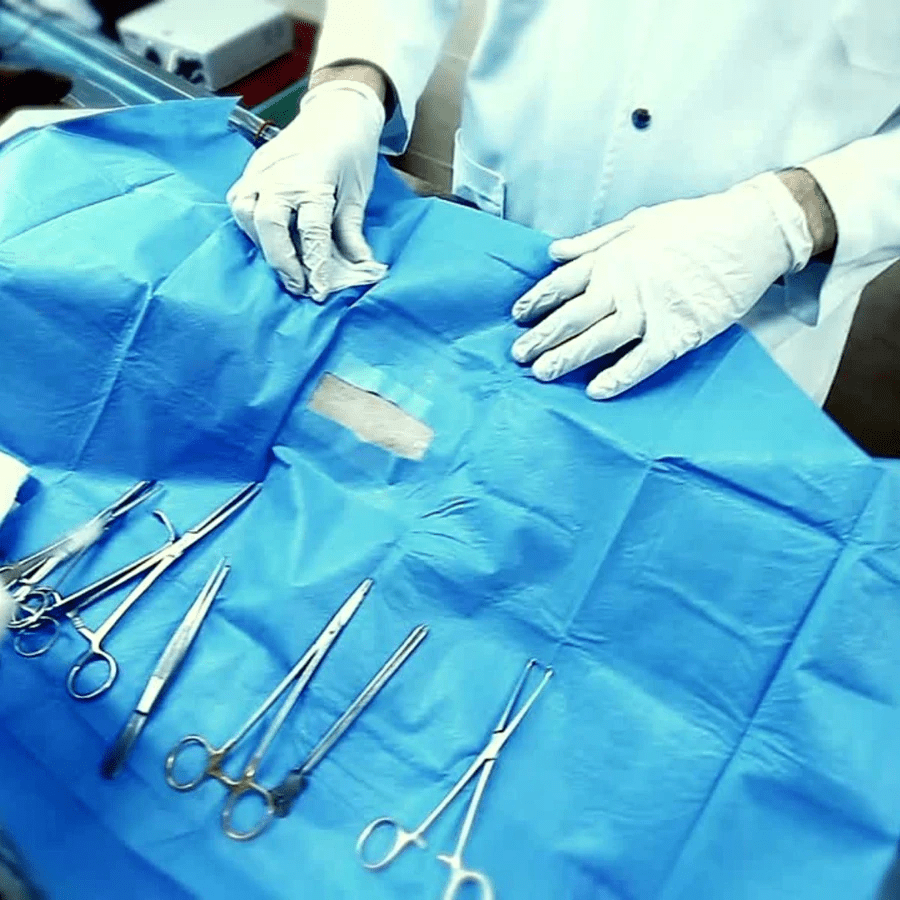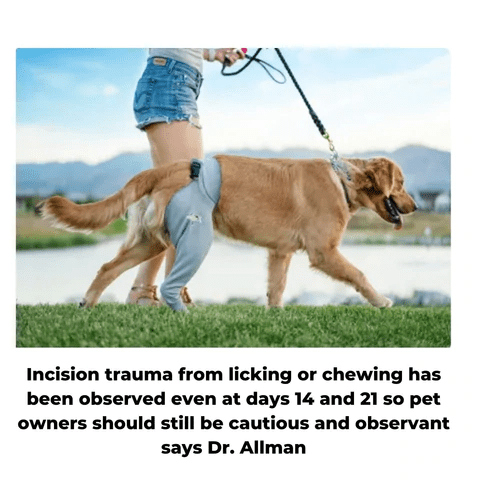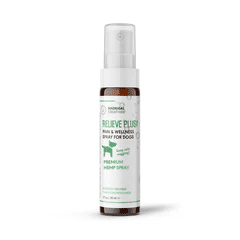All dogs and their charges may face a time when they need to prepare for surgery and more importantly post-surgery care. A surgery may come in the form of a simple surgery like spay and neuter as we talked about in this article as we celebrated Spay and Neuter Month in January or it may be a more complicated invasive surgery like that for a knee injury or other serious trauma.

Either way, dogs rely on pet owners during this time to provide optimum care. After the surgery pets may be confused and in pain, have particularly sensitive areas like an incision site or surgical site that requires treatment and dogs may have mobility limitations (which may be quite challenging for certain types of dogs and dogs at certain ages than others.)
In order to be the most prepared post surgery, I asked veterinary surgeon, Dr. David Allman, DACVS-SA, the designer and founder of Lick Sleeve, an innovative product (without the need for a cone) that can support dogs in post-operative care some of our top questions so that we could support our pets during this vulnerable time.
Surgical Recovery for Dogs
When considering surgery one has to first consider the recovery time. We asked Dr. Allman about how long it takes for a dog to recover from surgery, “it is important to note there are multiple aspects to being “recovered” from surgery, says Dr. Allman.
There is anesthetic recovery (due to the general anesthetic used in most surgeries), incisional healing, and then other tissues such as bone, tendon, ligament, and more that can take much longer to heal, however, he says, normally it takes 14-21 days for an incision to heal.

Due to this lengthy recovery time, Dr. Allman noted that it was important for dogs to be comfortable and not disrupt the healing process which is why he created the Lick Sleeve.
Products that we know of as the collar of shame, a plastic cone resembling an Elizabethan collar protected dogs from chewing on their incision but depending on the type of surgery may be uncomfortable and not fully protective.
On the other hand, the Lick Sleeve is primarily focused on protecting skin incisions throughout the healing process. According to Allman, about 90% of dogs will be healed between 14 and 21 days and can spend supervised time out of the Lick Sleeve as early as day 14 after surgery.
What should be in your post operative surgery kit for Optimum post-op care for your dog?
Recovery from a spay or neuter or other more invasive surgery should always begin with following your veterinarian’s specific instructions related to post-operative care. To help assist in the process here are a few post operative care items that Dr. Allman recommends:
- Following veterinary instructions for post-op care
- Protecting the wound site from pet licking or chewing
- Pain medications to ensure your dog or cat is comfortable
- Ensuring activity does not impede recovery
Veterinary Instructions Post Operative Care for Your Dog
Most vets will provide comprehensive instructions regarding post operative care which will be specifically tailored to your dog. Since those instructions will likely relate to the exact surgery, those should be your first guidance.
Preventing Postoperative Dog Self Trauma
Dr. Allman indicates that first and foremost, every pet owner must have a plan for how they are going to prevent their postoperative pet from self-trauma and licking of the incision. A traditional hard plastic Elizabethan collar is usually provided by the veterinary facility. In addition to this plastic collar, Dr. Allman recommends a wearable suit for additional protection, like the Lick Sleeve that he invented.
While there is not yet a Lick Sleeve brand recovery suit for spayed or neutered dogs, other similar wearable E-collar alternatives do exist and are very useful. Where possible something like the Lick Sleeve is preferred.
Keeping Dogs Confined Post Surgery
It is important to have a confinement strategy for recovery, says Allman. One of the best solutions for this is a free-standing octagonal playpen. The higher the walls the better as pets trying to jump out is the number one concern.
Practically confinement may be difficult for certain pets if they are not already used to it and crate trained they may prefer just relaxing to you close by with calming supplements discussed below.
Other cage/kennel confinement solutions include baby gates and standard kennels. It is important to note that many pets will not tolerate being isolated in a room behind a closed door, says Dr. Allman.
The most important is to not let your dog be too active so that incisions tear or pull and recovery is ultimately slowed.
Post Operative Medications and Supplements for Dogs
In addition to protecting the incision, pain medications and pain relievers or any other medication and supplements specific to your pet’s needs are important to their well-being and healing and reducing inflammation.
Inflammation will be a response to any trauma including surgery. Check out our article on managing inflammation and pet pain for other natural ways to reduce inflammation which will facilitate recovery such as with helpful support of products like Relieve Plus CBD from Hemp spray for dogs.

Another specific for post operative care which may be aided by products may be restricting activity, as discussed above, which is an important part of every recovery.
Added to that many spay/neuter patients are young and very active, which makes keeping them calm at the same time essential but also challenging.
Keeping pets Calm is a serious concern to avoid self-trauma and promote healing, containment like Dr. Allman suggests and is very helpful as restricting dog’s movements and crate rest is a very good idea.
For this, I love Calm calming dog hemp CBD, a serious calming and anti-anxiety medication, a blend of inflammation-fighting CBD from hemp and terpenes to promote a sense of calm and reduce anxiety in pets.
Some people may attempt to use human medications to calm pets which is not advised, says Dr. Allman.
Food and Comfort for Your Dog Post Surgery
Pets may also experience a loss of appetite when in serious pain and it may take them a while to be able to consume food. This is when we love to have on hand our rejuvenating dog CBD bone broth. You can find the recipe here, this bone broth can be frozen in a plastic bag and heated slightly for post-surgery use.
There are several other ways you can include inflammation fighting CBD into your dogs routine here are some top suggestions how to give CBD to pets.
In our dog post-operative kit:
-A crate or playpen to restrict the dog’s movements
–Calm CBD from hemp and Relieve- Plus CBD form hemp for pain relief (after consulting with your veterinarian)
-A means to protects your dog from licking and chewing the incision site, like the Lick Sleeve
-A comfortable bed and quiet place to recover
Some Final Thoughts on Postoperative Care from Dr. Allman
Post-operative care can be intimidating. I find that helping your dog behaviorally acclimate such as preparing them with restrictive time, obedience training or other fun tricks to encourage mental exercise will not only make recovery smoother but also your bond with your pet stronger.
This includes acclimating them to any restrictive or supportive devices that will be used such as the e-collar, braces, harnesses or wearables like the Lick Sleeve.
However as far as environment enrichment goes a few that I consider imperative are:
- Comfortable bedding (especially for pets with arthritis or soreness),
- safe toys,
- food and water bowls close to their confinement spot,
- non-slippery surfaces (especially on their path to outdoor restroom use), and finally don’t underestimate the value of sending videos and photos to your veterinarian for any concerns (the incision, signs of infection near the surgery site, excessive swelling, fluids, vomit or diarrhea, temporary lack of appetite) – these can help your vet quickly understand exactly what’s happening with your pet.
Our dogs rely on us in this vulnerable time of postoperative care. With these tips from the experts you will be well on your way to making your dog happy and comfortable.

